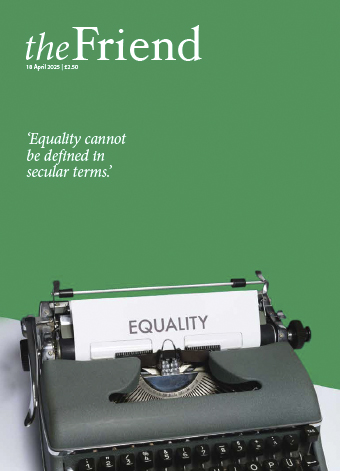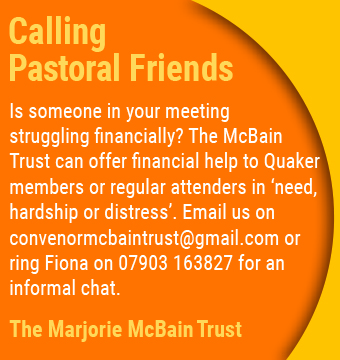
The Friend is a weekly magazine in which Friends speak to each other and to the wider world, offering their insight, ideas, news, nurture and inspiration.
Nurturing Quaker community, each issue offers a space for Friends to share their concerns, and to support each other in faith and witness.
The Friend: enriching, inspiring and connecting the Quaker community since 1843.
‘We are very conscious that many others are much worse affected than us, and we must ensure that we use our experience on their behalf too.’
Caroline Nursey, clerk to Westminster Meeting, following the police raid on the premises.
The testimonies unite Quakers worldwide. They spring from deep experience, and have been reaffirmed by successive generations. A testimony is not a belief, but is committed action arising out of Friends’ religious experience. Take our radical vision of equality, rooted in the recognition of that of God in everyone, which is in many ways the core of Quaker spirituality – and, in a way, is also responsible for two enduring stereotypes about Friends.
Equality is one of the core pillars of Quakerism. And the more I think about it, the more it seems to me that it’s the most important of these pillars. But at the same time it’s the most elusive: what does equality even mean in this context?
To a Friend from Britain, there is much in the Arizona desert which is unfamiliar: the sight of hummingbirds and javelinas (wild ungulates) by day, and the sound of coyotes by night. The cacti, which are older than many of the houses, juxtaposed with the futuristic driverless taxis. Then there’s the crosses, rosaries and books of saints in the gift shop of the Franciscan retreat centre, which for a week in March of this year served as host to the Friends World Committee for Consultation Section of the Americas gathering.
‘True significance lies not in the grounds and buildings but in the people… The gravestones speak of the past, of those who also served the meeting, whose lives are woven into ours, as ours will affect those still to come’ (William Sewell, 1977, Quaker faith & practice 10.08).
The global order that has dominated our lives since 1945 is breaking down. For many of us, US hegemony and nuclear deterrence constituted a threatening rather than reassuring order. But it did have at its heart at least a rhetorical commitment to democracy and human rights. As US democracy fails, strong men in some of the world’s most powerful countries are seeking to build a new world order that resembles the 1930s, a world of national rivalries and disdain, a world that sets us on the path to inevitable future conflict.
‘Yes, Prabhujee is worth listening to; so is the hurricane.’
‘To Quaker is to wait, sometimes we are very busy waiting.’
‘Governments put peace in prison and wonder why the war cry cries.’
‘The one who owns nothing gives everything away.’


Become a subscriber to enjoy unlimited access to our articles, dating back to 2009! Online subscribers get the Friend to their inbox each week, can comment on articles, and dive into our 1914-18 digital archive too!
Whether you are new to Quakerism or have been going to Meeting for years, you’ll find something here to inspire, inform and challenge you.
News | Views | Reviews
Written by and for Friends on the bench
Subscribe